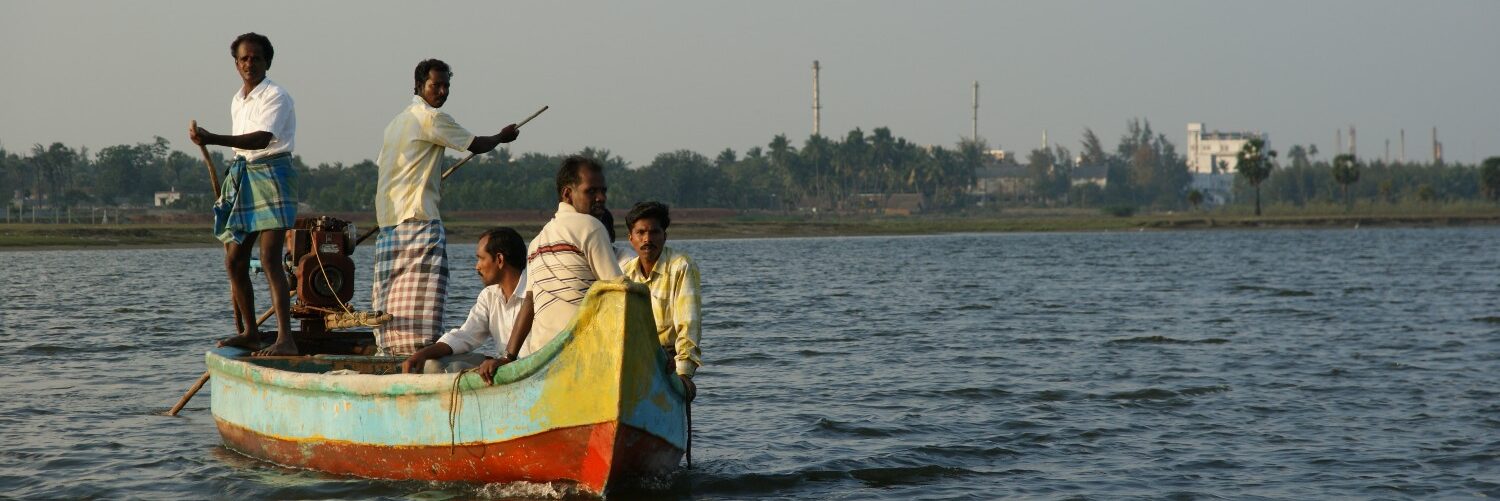PRESS RELEASE
10 JULY, 2003. CUDDALORE Confirming the widespread presence of pollution-induced impacts on the lives, health and livelihoods of villagers living in and around Cuddalore SIPCOT industrial estate in Tamilnadu, India, the Indian Peoples Tribunal on Environment and Human Rights recommended strict enforcement of the “Polluter Pays” principle to hold industries accountable for remediating environmental damage and compensating victims. More than 25 chemical industries, including pesticide, dyestuff and pharmaceutical plants, operate along a 4-kilometre coastal strip without appropriate infrastructure to deal with toxic effluents or hazardous wastes.
The tribunal headed by retired Madras High Court judge, Justice J. Kanakaraj, observes that: “SIPCOT industries have polluted the environment, and continue to do so. We’re also convinced that adequate and appropriate steps have not been taken by regulatory authorities, particularly the TNPCB, to prevent pollution and health damage. Neither has the Government paid any attention to the concerns and complaints of villagers.” Referring to Chemplast Sanmars proposal for a PVC factory as “patently unjust,” the tribunal urges the Government to reject the proposal for the plastic factory, known world over to be one of the most notorious polluters. The factory was set to come up with funding from the International Finance Corporation of the World Bank group. However, funding was forced to be put on hold after villagers and environmentalists rejected the proposal on grounds that PVC manufacturing, use and disposal is associated with releases of deadly poisons slotted for phaseout under the Stockholm Convention on Persistent Organic Pollutants. The Indian Peoples Tribunal also recommended that “The IFC should clarify how it will implement the Stockholm Convention, starting with its position on funding PVC or other POPs-generating projects.”
It has echoed the 1998 recommendation of the State Human Rights Commission calling for an end to the setting up of water-intensive or polluting industries in the SIPCOT region. “SIPCOT Phase II should be restricted to non-polluting industries that are not water-intensive,” the Tribunal recommends.
The report asserts that villagers and local bodies have suffered material losses due to industrialisation and industrial pollution in the SIPCOT region. “Wells, borewells and handpumps installed at considerable public expense have had to be abandoned because of groundwater contamination. Villagers are forced to spend disproportionately on medical costs to treat chronic ailments, many of which are caused or aggravated by pollution. Fisherfolk and farmers have seen their earnings diminish as pollution drastically compromised the productivity of local resources including land, river and groundwater.”
The impacts of pollution are disproportionately borne by the poor and oppressed communities, according to the report. The Tribunal observes that: “The dalit settlement of Kudikadu, and the village of Eachangadu are among the worst affected villages, hemmed in as they are by polluting industries. The socioeconomic status of the communities, particularly the dalits, impedes their ability to articulate their problems and demands, and reduces their chances of a fair and quick response from the Government. Cuddalore presents another example of environmental injustice and discrimination, where the poor and the disadvantaged are disproportionately impacted by the “costs” of “development.”
The Tribunal has issued a 20-point recommendation set covering various aspects including land acquisition claims, health and environmental remediation, financial compensation for damage to health and livelihood, and relocation of pollution-impacted villagers who choose to do so. The Tribunal has advised the villagers to approach the Loss of Ecology Authority for compensation for pollution-related damage to livelihood, property and livelihood bases. It has also asked the Government to take action against polluting units and facilities operating without valid license from the Pollution Control Board. In the course of the investigation, a TNPCB document revealed that 80 percent of the units in SIPCOT were operating without a valid license. According to TNPCB, many SIPCOT units have not been issued a license because they do not yet have the infrastructure to fulfil the conditions laid down by the Board. TNPCB says the applications are under constant review.
CUSECS, a company that operates a common effluent treatment plant in SIPCOT, has been set up in violation of the Coastal Regulation Zone Notification, 1991, and does not have a license to establish or operate from the TNPCB, the Tribunal found.
According to figures reported by SIPCOT units, 90 percent of the 20 million litres of ground water extracted each day are discharged as toxic effluents and wastewater. The combined effect of pollution and overextraction of water from sensitive coastal aquifers has robbed communities of drinking and irrigation water, and led to salinity intrusion in the aquifers. Nearly 20,000 people live in the influence zone of SIPCOT.
The 4-member panel has recommended that the industries must be made to pay for remediation of polluted lands and water resources, compensate communities for lost livelihoods and health effects, and put in place long-term health monitoring and remediation, and economic rehabilitation schemes.
“It is common for pollution victims to be revictimised by the agencies they approach for redressal of grievances. Lack of action, delays in delivering justice, ignoring complaints are all acts that revictimise impacted people. In the interests of justice, we hope that these recommendations are acted upon without delay,” said Justice J. Kanakaraj.
The tribunal has based its recommendations on evidence submitted by villagers, and responses of the industry and Government representatives at a series of public hearings held on November 16-17, 2002. The Tribunal received scientific and legal assistance from panel members and advisors. IPT panelists include scientist Dr. Amit Nair, chairperson of Tamilnadu State Commission for Women Prof. Vasanthi Devi and public health specialist and former Madras Municipal Corporation Health Officer Dr. Kannabiran.
The Indian Peoples Tribunal was set up in 1993 to highlight environmental and human rights violations by the State and private parties, and to give voice to the struggles of grassroots organizations and communities.
For more information, contact:
Sunil Scaria, Indian Peoples Tribunal. Tel: 09820336710 (Mumbai cell)
Nityanand Jayaraman, Forum on Corporate Accountability and Envrionmental Health.
Email: nity68@vsnl.com
Participating Organisations: Toxics Link, FEDCOT, Pasumai Thaayagam, Greenpeace India
